Dental Implants in Orlando, FL: Your Solution for Missing Teeth
Whether you are missing one, several, or an entire arch of teeth, Dental Flossophy can help restore your smile with a long-lasting solution that provides the same functionality and appearance as your natural teeth. We offer dental implants in Orlando, FL.
What are Dental Implants?
Dental implants are a revolutionary solution in dentistry, specifically designed for individuals suffering from missing teeth.
Dental implants are more permanent and secure than traditional dentures or bridges.
They consist of a titanium post surgically implanted into the jawbone, mimicking the root of a natural tooth. This post serves as a sturdy foundation for a custom-made crown, meticulously crafted to match the color and shape of your natural teeth, ensuring a seamless integration into your smile. The unique composition of dental implants offers a range of advantages, including preserving jawbone integrity and preventing facial structure alterations that often accompany tooth loss.
Dental Flossophy in Orlando, FL, leverages advanced technology and expertise to offer top-notch dental implant services, ensuring a comfortable and practical treatment experience for every patient.
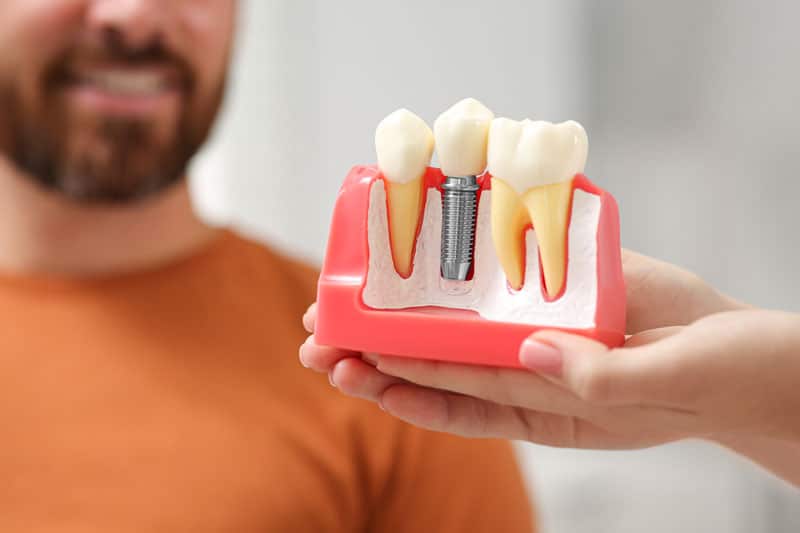
Hiossen Implant: High-Quality, Cost-Effective Teeth Replacement
At Dental Flossophy, we offer Hiossen implants as excellent teeth replacement options to our patients. Hiossen Implant is one of the largest manufacturers of dental implants in the world. Hiossen implants are well-regarded by patients and dentists and are known for their superior quality, durability, aesthetic quality, and user-friendly design.
Hiossen Implant offers a wide range of implants made from Ti alloy and unalloyed Titanium. It also has various implant systems that provide different options for all bone types. All Hiossen implants come from high-quality products customized to your needs. The brand’s new implant technology ensures perfect matching to your bone type and high-end manufacturing precision on all products.
Benefits of Dental Implants
Dental implants boast many benefits, making them a preferred choice for tooth replacement.
First, unlike dentures, they offer unparalleled stability and strength, which can slip or cause discomfort. This stability not only improves chewing efficiency but also enhances speech clarity.
Another significant advantage is their ability to maintain facial structure by preventing bone deterioration, a common consequence of tooth loss. Dental implants are also renowned for longevity and can last a lifetime with proper care. Furthermore, they contribute to improved oral health as they do not require altering adjacent teeth like bridges.
Dental Flossophy’s expertise in dental implant procedures ensures that patients in Orlando, FL, receive the highest quality care. The company emphasizes customizing implants to fit individual needs and aesthetics, thus boosting confidence and improving overall quality of life.
The Dental Implant Procedure: What to Expect
The dental implant procedure is a multi-step process that begins with a detailed consultation at Dental Flossophy.
During this initial phase, a comprehensive examination, including X-rays or 3D imaging, assesses your oral health and jawbone structure. The actual implantation involves surgically placing the titanium post into the jawbone, which is then allowed to heal and integrate with the bone, known as osseointegration. This healing phase can take several months, during which we may provide a temporary tooth replacement option.
Once the implant fully integrates with the jawbone, an abutment is placed on top of the post, serving as a connector for the final crown. The custom-made crown is then attached, completing the restoration.
Dental Flossophy in Orlando, FL, ensures patient comfort and safety throughout the procedure, employing advanced techniques and sedation options as needed. We will provide post-procedure care instructions to ensure the longevity and success of the implant, along with regular follow-up visits to monitor progress and oral health.
Tooth Replacement Options Using Dental Implants
Implants can replace missing teeth in a variety of ways. We recommend them to:
Replace One Tooth — When one tooth is missing, a single implant is inserted into the bone to replace the root part of that tooth; a crown then goes on top to simulate an actual tooth. This treatment choice has the highest success rate, making it the best long-term investment for replacing a missing tooth. Even if the initial cost is slightly higher than other options, it is the most cost-effective solution. An implant will never decay or need root canal treatment, and it feels just like the tooth that was there.
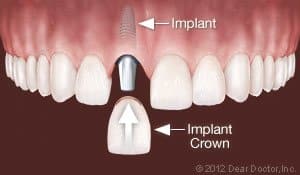
Replace Multiple Teeth — Implants provide an ideal replacement mechanism when you have more than one tooth missing. You don’t even need one implant for every missing tooth. Instead, implant teeth can act as supports for fixed bridgework. For example, if you are missing three teeth in a row, we can place two implants, one on either side of the gap, and a crown in between that has no implant underneath. That way, you won’t need to use any of your remaining natural teeth as bridge supports, which could weaken them and make them more susceptible to decay.
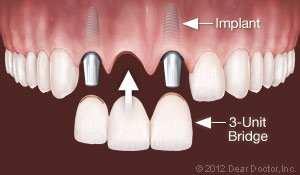
Replace All Teeth Permanently — Implants can support an entire arch of upper or lower replacement teeth fixed into the mouth and never removed. Sometimes the new teeth can be supported by as few as four implants. It’s comparable to the structure of a table, which only needs four legs to hold it up. In cases where jawbone density and volume have deteriorated, 5 or 6 implants can support a row of 10 to 12 teeth. Dental implant replacement teeth protect your jawbone, won’t slip, and should last a lifetime.
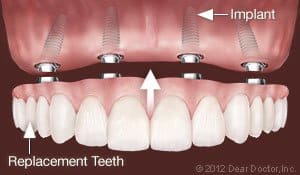
Support Removable Dentures — Implants can make removable dentures more comfortable, effective, and healthier to wear. Traditional dentures rest on the gums and put pressure on the underlying bone. This condition accelerates bone loss, so the jaw shrinks and the dentures slip, particularly on the bottom. But today dentists can attach a removable denture onto implants, transferring that pressure into the bone structure rather than the bone surface. It prevents the dentures from slipping while you eat and speak, and preserves the bone directly beneath them.
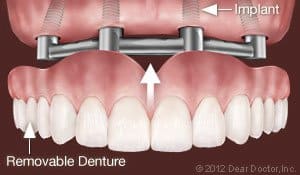
Before and After








Dental Implant Care and Maintenance
There are only two ways an implant can lose attachment to the bone and fail once successfully fused: poor oral hygiene or excessive biting forces. Poor oral hygiene and/or a lack of regular cleanings can lead to a destructive bacterial infection called peri-implantitis. Flossing and brushing your teeth on a daily basis, along with regular professional cleanings, can prevent this.
Excessive biting forces can come from either a habit of clenching or grinding your teeth or an insufficient number of implants to handle the forces generated by your bite. You should receive the correct number of implants so this does not happen. And if you have a habit of grinding or clenching your teeth, a nightguard will be recommended to protect your implants.
Implants are a long-term investment in your smile, health, and well-being, so it’s best to protect your investment.
Interested in learning more? Contact us or schedule an appointment today. Your smile will thank you!

